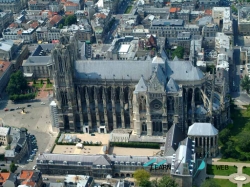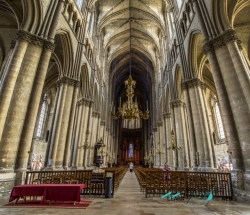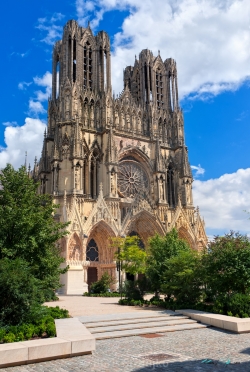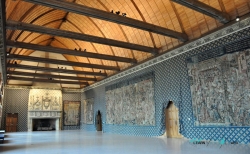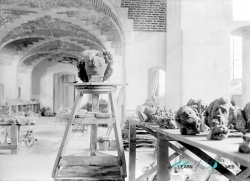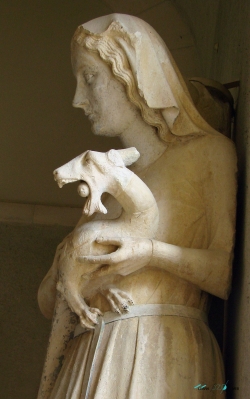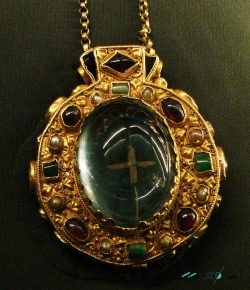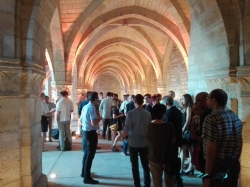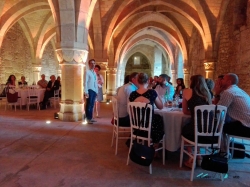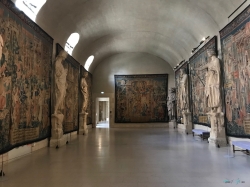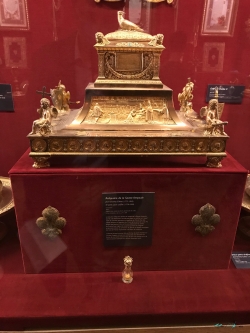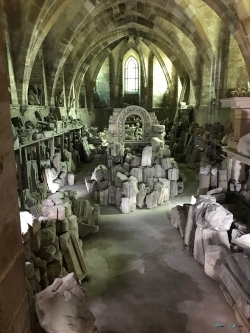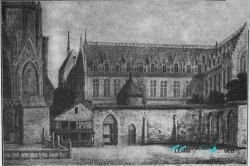The Palace of Tau in Reims, France, was the palace of the Archbishop of Reims. It is associated with the kings of France, whose coronation was held in the nearby cathedral of Notre-Dame de Reims and the following coronation banquet in the palace itself. Today, it serves to host cultural events for the city of Reims. In recent years it has been the setting for Sciences Po Paris's RIMUN association's annual gala.
A large Gallo-Roman villa still occupied the site of the palace in the 6th and 7th centuries, and later became a Carolingian palace. The first documented use of the name dates to 1131, and derives from the plan of the building, which resembles the letter Τ (tau, in the Greek alphabet). Most of the early building has disappeared: the oldest part remaining is the chapel, from 1207. The building was largely rebuilt in Gothic style between 1498 and 1509, and modified to its present Baroque appearance between 1671 and 1710 by Jules Hardouin-Mansart and Robert de Cotte. It was damaged by a fire on 19 September 1914, and not repaired until after the Second World War.
The Palace was the residence of the kings of France before their coronation in Notre-Dame de Reims. The king was dressed for the coronation at the palace before proceeding to the cathedral; afterwards, a banquet was held at the palace. The first recorded coronation banquet was held at the palace in 990, and the most recent in 1825.
The palace has housed the Musée de l'Œuvre since 1972, displaying statuary and tapestries from the cathedral, together with the remains of the cathedral treasury and other objects associated with the coronation of the French kings.
Notre-Dame de Reims, is a Roman Catholic cathedral in the French city of the same name, the archiepiscopal see of the Archdiocese of Reims. The cathedral was dedicated to the Virgin Mary and was the traditional location for the coronation of the kings of France.
The cathedral church is thought to have been founded by the bishop Nicasius in the early 5th century. Clovis was baptized a Christian here by Saint Remigius, the bishop of Reims, about a century later. He was the first Frankish king to receive this sacrament. Construction of the present Reims Cathedral began in the 13th century and concluded in the 15th century. A prominent example of High Gothic architecture, it was built to replace an earlier church destroyed by fire in 1210. Although little damaged during the French Revolution, the present cathedral saw extensive restoration in the 19th century. It was severely damaged during World War I and the church was again restored in the 20th century.
The Palace of Tau, together with the Cathedral of Notre-Dame and the former Abbey of Saint-Remi, became a UNESCO World Heritage Site in 1991. It attracts around 100,000 visitors each year.
A large Gallo-Roman villa still occupied the site of the palace in the 6th and 7th centuries, and later became a Carolingian palace. The first documented use of the name dates to 1131, and derives from the plan of the building, which resembles the letter Τ (tau, in the Greek alphabet). Most of the early building has disappeared: the oldest part remaining is the chapel, from 1207. The building was largely rebuilt in Gothic style between 1498 and 1509, and modified to its present Baroque appearance between 1671 and 1710 by Jules Hardouin-Mansart and Robert de Cotte. It was damaged by a fire on 19 September 1914, and not repaired until after the Second World War.
The Palace was the residence of the kings of France before their coronation in Notre-Dame de Reims. The king was dressed for the coronation at the palace before proceeding to the cathedral; afterwards, a banquet was held at the palace. The first recorded coronation banquet was held at the palace in 990, and the most recent in 1825.
The palace has housed the Musée de l'Œuvre since 1972, displaying statuary and tapestries from the cathedral, together with the remains of the cathedral treasury and other objects associated with the coronation of the French kings.
Notre-Dame de Reims, is a Roman Catholic cathedral in the French city of the same name, the archiepiscopal see of the Archdiocese of Reims. The cathedral was dedicated to the Virgin Mary and was the traditional location for the coronation of the kings of France.
The cathedral church is thought to have been founded by the bishop Nicasius in the early 5th century. Clovis was baptized a Christian here by Saint Remigius, the bishop of Reims, about a century later. He was the first Frankish king to receive this sacrament. Construction of the present Reims Cathedral began in the 13th century and concluded in the 15th century. A prominent example of High Gothic architecture, it was built to replace an earlier church destroyed by fire in 1210. Although little damaged during the French Revolution, the present cathedral saw extensive restoration in the 19th century. It was severely damaged during World War I and the church was again restored in the 20th century.
The Palace of Tau, together with the Cathedral of Notre-Dame and the former Abbey of Saint-Remi, became a UNESCO World Heritage Site in 1991. It attracts around 100,000 visitors each year.



